Welded Wire Meshes and Fences
What are they?- As the name implies, they are made from wires that have been welded into a mesh.
- In most cases, the same gauge of wire is used throughout the roll.
- Welded joints are rigid and have little flexibility.
- Many welded products with larger openings are used as fencing.
- Mesh sizes can range from 1/2" x 1/2" up to 6" x 6".
- Meshes with smaller openings are usually made with lighter gauge wires.
- These are mostly used as screening.
- Some specifications of welded meshes are vinyl coated.
- Welded fencing is ideal to use on flat terrain where little flexibility is necessary.
- Some examples of uses:
- Cages for animals
- Garden fences
- Dog kennels
- Partition dividers
Woven Wire Meshes and Fences
What are they?
- Fences made by weaving the wires into a mesh.
- Different gauge wires are sometimes used in the same roll.
- Woven joints are flexible yet very strong.
- There are a wide variety of mesh size openings available.
- Hexagonal netting (chicken wire), field and farm fence, deer and wildlife fence, chain link and ornamental fence are some examples.
What are their uses?
- Woven wire fences are ideal to use in situations where the ground is uneven.
- The inherent flexibility allows the fence to adjust more easily to grade changes.
- Some examples of uses:
- Horse paddocks
- Boundary fence
- Orchard fence
- Farm fence





.jpg?width=239&name=daiga-ellaby-WTm7llmj4ro-unsplash%20(1).jpg)







.jpeg?width=358&name=AdobeStock_207045510%20(1).jpeg)














